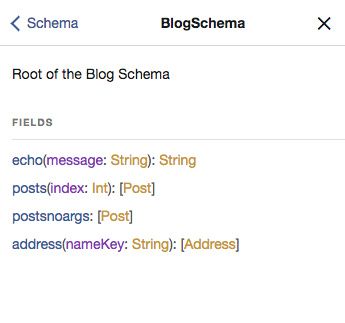GraphQL使用指南(开始)
Graphql 为查询而生,是一个由Facebook提出的应用层查询语言,所以我们首先试试它的查询功能吧.
准备工作
- 克隆库:
git clone https://github.com/zhouyuexie/learn-graphql
- 安装依赖:
cd learn-graphql && npm install
- 运行:
npm start
现在打开你的浏览器输入http://localhost:12580/graphql,或者点击这里.
GraphQL 初试
在左边窗口输入以下内容:
{
echo(message:"world")
}
你会在右边窗口看到这个返回的数据:
{
"data": {
"echo": "hello: world"
}
}
提示:右上角有个Docs,点击它你可以看到你可以看到有关查询的信息.
你可以看到上面那行
echo(message:String):String,说明echo接受一个message的参数,并且返回一个string类型的数据,点击echo你可以看到更详细的内容.
有参数查询
上面
echo只是一个简单的演示,并没有查询字段,现在我们开始根据客户端的要求返回定制的数据吧.
现在让你查询posts你应该知道怎么开始了吧?对的,我们想看文档,点击右上角开始吧.
上图就有你想要的东西,你会看到posts模式接受一个整数型的index,然后返回一个Post类型数据,我们开始试试吧:
{
posts(index:1){
_id,
title,
content
}
}
大概返回如下数据:
{
"data": {
"posts": [
{
"_id": "03390abb5570ce03ae524397d215713b",
"title": "New Feature: Tracking Error Status with Kadira",
"content": "Here is a ...."
}
]
}
}
无参数查询
目前为止我们的查询都需要一个参数,毕竟查询的时候大多数都是需要参数的,现在我们来试试一个不需要参数的例子.
{
postsnoargs{
_id,
title,
content
}
}
好了,执行一下吧!你会发现没什么不同,就是服务器返回的数据是"固定"的而已,对于获取一些首页这类数据我们不需要给定参数是非常有用的.
嵌套查询
有时候我们需要对查询到的数据进行筛选,比如限制大小,这时候就需要一个嵌套查询来实现这个功能了.
比如下面这个查询A开头的全国省市信息:
{
address(nameKey:"A"){
ShortKey,
Content(limit:5) {
Id,
Code,
Name,
FirstStr
}
}
}
服务器返回:
{
"data": {
"address": [
{
"ShortKey": "A",
"Content": [
{
"Id": 36,
"Code": "152900",
"Name": "阿拉善盟",
"FirstStr": "A"
},
{
"Id": 39,
"Code": "210300",
"Name": "鞍山市",
"FirstStr": "A"
},
{
"Id": 105,
"Code": "340800",
"Name": "安庆市",
"FirstStr": "A"
},
{
"Id": 155,
"Code": "410500",
"Name": "安阳市",
"FirstStr": "A"
},
{
"Id": 293,
"Code": "513200",
"Name": "阿坝藏族羌族自治州 ",
"FirstStr": "A"
}
]
}
]
}
}
其中的Content字段加上了限制返回前五个市的信息,注意其中的limit是服务器设置的,并不是Graphql的关键字.
多种查询混合
这其实很简单,也就是将上面的几个查询混合写到一起就可以了:
{
address(nameKey:"A"){
ShortKey,
Content(limit:2) {
Id,
Code,
Name,
FirstStr
}
},
posts(index:1){
_id,
title
}
}
服务器返回:
{
"data": {
"address": [
{
"ShortKey": "A",
"Content": [
{
"Id": 36,
"Code": "152900",
"Name": "阿拉善盟",
"FirstStr": "A"
},
{
"Id": 39,
"Code": "210300",
"Name": "鞍山市",
"FirstStr": "A"
}
]
}
],
"posts": [
{
"_id": "03390abb5570ce03ae524397d215713b",
"title": "New Feature: Tracking Error Status with Kadira"
}
]
}
}
查询别名
有时候我们想这样查找使数据分开,方便自己各个地方调用:
{
postsnoargs{
title
},
postsnoargs{
_id
}
}
我们设想得到的数据是这样的:
{
"data": {
"postsnoargs": {
"title":[
"title": "Sharing the Meteor Login State Between Subdomains",
],
"_id":[
"_id": "0176413761b289e6d64c2c14a758c1c7"
]
}
}
}
但其实服务器返回的是这样的:
{
"data": {
"postsnoargs": [
{
"title": "Sharing the Meteor Login State Between Subdomains",
"_id": "0176413761b289e6d64c2c14a758c1c7"
}
]
}
}
这时候我们就需要设置别名了,否则服务器返回的时候会合并你的数据:
{
posttitle:postsnoargs{
title
},
postid:postsnoargs{
_id
}
}
服务器返回:
{
"data": {
"posttitle": [
{
"title": "Sharing the Meteor Login State Between Subdomains"
}
],
"postid": [
{
"_id": "0176413761b289e6d64c2c14a758c1c7"
}
]
}
}
总结
以上就是你使用Graphql查询所需要知道的,下面我们开始介绍Mutations.
更多的教程请移步这里


